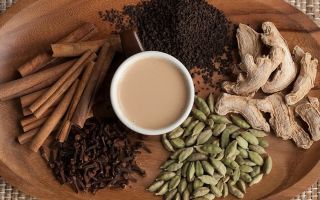Content
- 1 What is Masala
- 2 The origin story of Masala tea
- 3 The chemical composition and calorie content of Masala tea
- 4 Why is Masala tea useful?
- 5 The effect of Masala tea spices on the human body
- 6 The benefits of Masala tea for weight loss
- 7 How to brew Masala tea properly
- 8 Masala tea recipes
- 9 Can you drink Masala tea during pregnancy and breastfeeding?
- 10 Masala tea for children
- 11 Harm of Masala tea and contraindications for use.
- 12 How to choose and store
- 13 Conclusion
- 14 Reviews
The benefits and harms of Masala tea and other interesting information about the drink, which is famous for its quality and taste, have long been studied by experts. It turns out that the properties of tea can not only cheer you up with its pleasantly warming taste, but also cure many diseases.
What is Masala
Indian cuisine is famous for its varied combinations of all kinds of spices called Masala. Their use adds spice and variety to everyday food, and their beneficial properties and aroma make drinks new and pleasant.
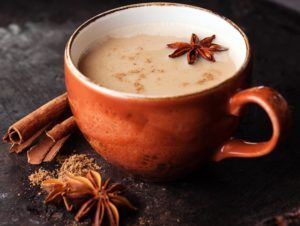
The origin story of Masala tea
Little is known about the origin of tea. Some sources indicate that tea became widely used in the seventh millennium BC, while others - that in the third. The same disagreement arises when determining the place where this tea was first created. Many historians are still of the opinion that he is from India (modern-day Thailand).
The beneficial properties of Masala tea did not immediately become known to the whole world. In 1835, the first tea plantations began to appear on the territory of the state of Assam, and the British, in order to increase the productivity of their slaves and make them more resilient, began to water them with this healthy drink.
Later, Indian traders began to actively distribute Masala tea, traveling and selling it in markets and bazaars at very high prices. To get more value from sales, they began to mix in spices. This is how modern Indian tea originated. Only in the late 19th - early 20th centuries did Masala become accessible to everyone.
Now the people of India offer this drink to tourists as a traditional one, and they praise it, informing about its properties and benefits.
The chemical composition and calorie content of Masala tea
The calorie content of Indian tea is an unstable indicator, since it depends on the correct preparation and the amount of added substances. There is an exact list of ingredients that are required when making a drink. If you adhere to it, then the caloric value per 100 g of dry mass will be:
|
Caloric content (kcal) |
Proteins (g) |
Fat (g) |
Carbon (g) |
|
379 |
15 |
15 |
45 |
The ratio of proteins, fats and carbons:

This percentage of nutrients allows the product to be included in the diet, despite the high fat content.
Mineral and vitamin composition of tea, its beneficial properties and harm depend on the components, which can vary in different recipes. If we take into account only one serving of the drink according to the classic recipe, then it contains:
|
Vitamins
|
Minerals |
||||
|
macronutrients |
trace elements |
||||
|
AND |
12.1 μg |
Calcium |
520 mg |
Iron |
2.4 mg |
|
IN 1 |
0.2 mg |
Sodium |
30 mg |
Aluminum |
24.3 mcg |
|
AT 2 |
0.098 mg |
Potassium |
143.11 mg |
Iodine |
4.37 mcg |
|
AT 4 |
11.46 mg |
Magnesium |
18.96 mg |
Cobalt |
0.388 μg |
|
AT 5 |
0.184 mg |
Sulfur |
14.08 mg |
Manganese |
0.0026 μg |
|
AT 6 |
0.024 mg |
Chlorine |
53.4 mg |
Copper |
2.83 mcg |
|
AT 9 |
2,427 mcg |
Phosphorus |
65.5 mg |
Molybdenum |
2,427 mcg |
|
AT 12 |
0.194 μg |
|
|
Tin |
6.31 μg |
|
FROM |
0.76 mg |
|
|
Selenium |
0.971 μg |
|
D |
0.024 μg |
|
|
Strontium |
8.25 μg |
|
H |
1.553 mcg |
|
|
Fluorine |
14.56 mcg |
|
PP |
0.7181 mg |
|
|
Chromium |
0.97 mcg |
|
Niacin |
0.279 mg |
|
|
Zinc |
0.194 mg |
|
Retinol |
0.01 mg |
|
|
|
|
|
Beta carotene |
0.004 mg |
|
|
|
|
The chemical composition of the product can be adjusted independently by experimenting and adding new spices.
Why is Masala tea useful?
The beneficial properties of Masala tea, the benefits of which are invaluable to the body, have been used since ancient times in order to improve well-being and activate the work of many organ systems. Due to its rich chemical composition, it is capable of:
- speed up metabolism;
- burn excess fat;
- improve immunity;
- resist viral and bacterial diseases;
- cheer up;
- increase concentration and brain activity;
- eliminate the formation of blood clots, strengthen the cardiovascular system;
- removing unnecessary cholesterol;
- normalize the digestive tract;
- charge with additional energy;
- hinder the development of oncology.
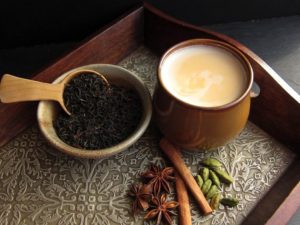
Indian Masala tea, the benefits and harms of which should be carefully studied by everyone who decided to add it to their diet, has a large number of healing properties, therefore it is actively used as a natural remedy for many diseases.
The effect of Masala tea spices on the human body
The drink contains many different spices, thanks to which it gained popularity. The classic recipe involves the use of:
- Cinnamon. It lowers blood sugar levels, normalizes digestion and stimulates brain activity. It is better to take a spice in the form of a stick rather than a powder.
- Cardamom. Benefit - in the ability to strengthen immunity, eliminate inflammatory processes in the body and improve vision. Usually, this taste dominates in the drink, so one serving includes 1 pc.
- Carnations. The plant not only gives the tea a warming effect, but also a pleasant, memorable aroma. Useful properties include the ability to speed up metabolism, strengthen the cardiovascular system and charge additional energy.
- Ginger. It gives the tea a sweet taste, and also warms and stimulates a person to show positive emotions. It is a good pain reliever that improves the general well-being in case of colds and also prevents the development of cancerous tumors.
- Black pepper. The spice makes the drink slightly spicy, which is good when drinking tea. Benefit - in providing a diuretic, antibacterial effect.
Additional spices that can be added at will based on taste preferences include bay leaves, lemongrass, saffron, star anise and basil.
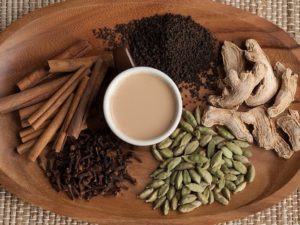
The benefits of Masala tea for weight loss
To get rid of excess weight without putting too much effort, you can take advantage of the benefits of Masala tea for weight loss. The composition includes spices that accelerate metabolism without harm. Thanks to this, the drink is well suited for those who wish to lose those extra pounds.
How to brew Masala tea properly
In order for aromatic Masala tea not only to quench thirst, but also to improve overall well-being without harm, you need to adhere to time-tested recipes when preparing. You can brew tea yourself in several ways:
- Method 1. Heat water with all the spices in a special bowl. After boiling, pour in milk and sweetener. Boil the mixture for 4 minutes and filter.
- Method 2. Heat milk with water, combine with all spices and additives. Close the lid and set aside for 15 minutes. After adding dry tea mixture, re-boil and filter.
- Method 3. Brew dry mass, boil water separately and combine it with tea, which has managed to be infused, and spices.Filter the mass, add milk and sweeteners.
The brewing method will depend not only on the taste, but also on the beneficial properties and harm of the product.
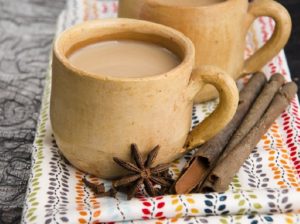
To maximize the benefits of the healing elixir and reduce possible harm, it is recommended to choose a method with less thermal effect on the components.
Masala tea recipes
The easiest way is to brew a ready-made mixture of Masala tea, but a drink prepared at home has many beneficial properties. As confidence grows that only quality products are used.
Classical
To brew Masala tea without harm, endowed with many useful substances, according to the traditional recipe, you need to carefully study the properties.
Ingredient List:
- 400 ml of milk;
- 400 ml of water;
- 4 carnations;
- 2 pods of cardamom;
- 2 peppers;
- 1 fell. cinnamon;
- 2 pieces of ginger;
- 2 tbsp. l. black tea.
Cooking technology:
- Grind the pepper and cardamom first.
- Combine water with milk and all spices in any container.
- Boil the resulting mass and keep on fire for 5-10 minutes.
- Add sugar with black tea, cook for 5 minutes.
- Filter the composition using a strainer - and you can serve it on the table.
With fennel and nutmeg
Masala tea ingredients such as fennel and nutmeg not only improve the taste of the drink, but also make it healthier.
A set of products:
- 250 ml of water;
- 500 ml of milk;
- 7 g cinnamon;
- 1 tbsp. l. black tea;
- 4 mountains black pepper;
- 2 carnations;
- 2 cardamom;
- 12 g fennel;
- 1 star anise;
- 1 nutmeg;
- 25 g sugar.
Step by step recipe:
- Grate the ginger in advance and chop the nutmeg.
- Boil water and milk separately.
- Pour Masala tea into water, and combine milk with ginger, pepper and nutmeg.
- After 5 minutes of boiling, add the crushed spices that remain to the milk.
- After 2 minutes, add sugar and remove both formulations from heat.
- Stir the prepared tea with milk and strain.
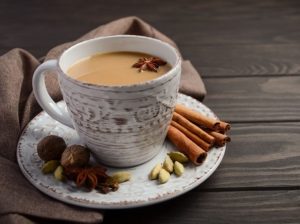
With honey and anise
One of the original solutions would be to make Masala tea with anise and honey, which bring tangible benefits to the body, therefore they are often used as spices for tea. To prepare a healthy drink you will need:
- 250 ml of water;
- 1 anise;
- 15 g of honey;
- 2 tsp black tea;
- 250 ml of milk;
- 20 g ginger;
- 3 cardamom;
- 2 fennel;
- 10 g cinnamon.
Cooking process:
- Boil water with all the spices that you grind in advance.
- Add milk and dry tea mass.
- Boil for 2 minutes, filter and add honey.
Green tea with vanilla and star anise
It is contraindicated for many to drink coffee in the morning, but it is required to cheer up. For these purposes, the beneficial properties of green tea with vanilla and star anise are suitable, since the main components are able to endow the body with additional energy and improve mood.
Ingredient set:
- 125 ml of water;
- 250 milk;
- 5 pieces. cardamom;
- 3 carnations;
- ½ star anise;
- 5 g ginger;
- 5 g nutmeg;
- 5 g vanilla;
- 2 tsp green tea;
- 50 g sugar;
Step-by-step recipe:
- Grind and fry the spices.
- Bring milk to a boil, add spices and sugar.
- Brew tea, combine both ingredients and filter.
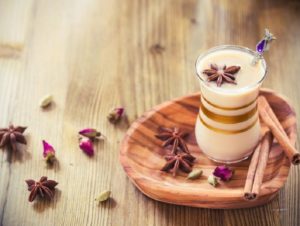
With mint and sweetener
Such aromatic and healthy Masala tea will impress with its unusual taste. It is recommended to use honey or maple syrup as a sweetener, as they are high in nutrients and are less harmful than sugar.
List of components:
- 200 ml of water;
- 200 ml of milk;
- 1 clove;
- 1 bunch of mint;
- ¼ lime;
- 1 tbsp. l. black tea;
- 1 cardamom;
- ½ ginger (grated);
- ½ tsp cinnamon;
- 2 tbsp. l. honey or maple syrup;
Sequencing:
- Mix water with all the spices and bring to a boil.
- Add the leaves, sweetener, lime wedges and milk.
- Boil for 4 minutes and filter the drink through a strainer.
Can you drink Masala tea during pregnancy and breastfeeding?
The benefits for women of Masala tea is manifested in the analgesic effect during menstruation. But during pregnancy, it is not recommended to use, since it is an analogue of caffeine that can be harmful. It negatively affects the nervous system, as well as the tone of the uterus. Excessive use can cause miscarriage. Also, you should not take it during lactation, since the spices contained in the drink negatively affect the still unformed digestive system of the fetus.
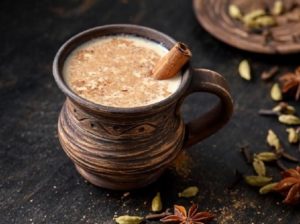
Masala tea for children
A lot of spices are not allowed for children under 6 years old - they can harm a small body. But for schoolchildren, tea will be useful. But only if the child does not have serious health problems and contraindications. Due to its many beneficial properties, tea should be drunk by those who are preparing for exams or tests, since it has a beneficial effect on brain activity and saturates the body with additional energy.
Harm of Masala tea and contraindications for use.
Along with many useful properties, a natural elixir has restrictions on its use, ignoring which can be harmful:
- individual intolerance;
- tendency to allergies;
- chemical burns of the digestive system;
- lactase deficiency.
In case of allergy or intolerance to any particular component, you can simply exclude from the recipe and continue drinking delicious Masala tea without harm to health.
How to choose and store
It is important to choose the right product in order to fully experience the taste and get the maximum benefit without harm. Therefore, it is best to buy in trusted places. There are many shops on the Internet that specialize in the sale of similar products grown in ecologically clean places without the use of chemicals.
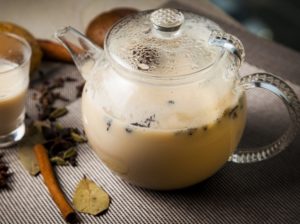
Store the dry mixture in an airtight container or container in a dark place for no more than 3 weeks.
Conclusion
The benefits and harms of Masala tea have been thoroughly studied by scientists, this allows you to include it in your daily diet. Since the pleasant taste of the drink, its peculiar aroma, nutritional value, high content of biologically active substances, will not only invigorate and warm, but also support human health.

